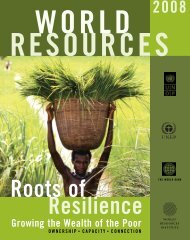jp8589 WRI.qxd - World Resources Institute
jp8589 WRI.qxd - World Resources Institute
jp8589 WRI.qxd - World Resources Institute
You also want an ePaper? Increase the reach of your titles
YUMPU automatically turns print PDFs into web optimized ePapers that Google loves.
WORLD RESOURCES 2005<br />
104<br />
Engaging with rural communities can also help companies<br />
meet demand for specialized products such as certified<br />
lumber or organic foods. In 1990 the U.S. company Smith and<br />
Hawken faced growing consumer demand for sustainably<br />
harvested tropical hardwoods such as mahogany for furniture<br />
and other high-end home furnishings. In response, it helped<br />
campesino forestry groups in northern Honduras—community<br />
organizations of 5-50 members that manage state forests<br />
under use agreements with the government—attain certification<br />
for their mahogany and other hardwoods. The campesino<br />
groups are now using the publicity they have received to<br />
expand the market for less well-known woods (Mayers and<br />
Vermeulen 2002:147).<br />
Arrangements like the ones undertaken by Swiss Lumber<br />
and Smith and Hawken to contract with rural farmers to<br />
supply trees are perhaps the most common arrangements<br />
between poor households and natural resource companies.<br />
These “outgrower” schemes are programs where timber<br />
companies pay small farmers to plant trees on their own (or<br />
sometimes communal) land in order to ensure a reliable supply<br />
of timber in the future. The schemes, which can be found in<br />
many countries on every continent, vary widely by company<br />
and by country. In some, the company provides seedlings,<br />
access to credit, technical help in planting and caring for the<br />
trees, and even the construction of roads for harvest. In other<br />
cases, the arrangements are more sparse, with no finance and<br />
little other than seedlings and an offer to buy the trees at<br />
market price (Mayers and Vermeulen 2002:140-154).<br />
The poverty-reduction potential of outgrower schemes<br />
varies, but can be sizable. In the South African province of<br />
KwaZulu Natal, some 10,000 farmers—more than half of them<br />
women—participate in the outgrower programs of the Sappi and<br />
Mondi paper companies. With materials supplied by the companies,<br />
the farmers grow eucalyptus trees on their small plots of a<br />
few hectares. Sappi and Mondi agree to purchase the plantation<br />
wood after 6-7 years for their pulp mills. Studies have shown that<br />
participating in these outgrower programs contributes 12-45<br />
percent of the income needed for a household to remain above<br />
the “abject poverty line,” so outgrower programs can be important<br />
sources of stability in some rural economies (Scherr et al<br />
2003: 51; Mayers and Vermeulen 2002:143).<br />
For companies, outgrower programs can benefit the<br />
corporate image as well as securing the timber or pulp supply<br />
for the future. In Brazil, pulp-and-paper company Klabin<br />
works with timber outgrowers in a variety of joint ventures that<br />
have generated annual income for farmers ranging from<br />
US$76 to $217 per hectare. Klabin’s stated reasons for running<br />
its outgrower program include the need to maintain a good<br />
company image. The company also tries to gets its outgrowers<br />
certified as sustainable timber producers in order to supply the<br />
demand from local furniture companies that want certified<br />
wood. Klabin has guaranteed 10 years of timber supply to<br />
these small furniture companies, which it hopes its outgrowers<br />
will provide (Mayers and Vermeulen 2002:143).<br />
Despite the promise of such programs, nature-based<br />
investments in poor communities are not necessarily easy for<br />
companies or communities, and are by no means always<br />
successful. The history of such partnerships shows many<br />
missteps, reflecting the difficult circumstances of poor households<br />
that push them to seek quick returns at low risk, and<br />
demands investments of training and trust-building. For<br />
example, several outgrower programs in India were plagued<br />
with inconsistent participation by poor families. Free seedlings<br />
offered by the companies were often neglected; loan and credit<br />
deals were too complicated and cumbersome to be attractive;<br />
and participants often abandoned the programs when they<br />
learned they could find better prices on the open market than<br />
the prices offered by the companies (Mayers and Vermeulen<br />
2002:v, 45-52).<br />
For both companies and communities, partnerships<br />
sometimes have high transaction costs, and take negotiation<br />
and continued care to succeed. In addition, coping with<br />
government regulations can be confusing and time-consuming.<br />
Experience shows that it is important for both sides to enter an<br />
outgrower agreement with realistic expectations about the<br />
income potential and the responsibilities of each side. Outside<br />
legal advice, perhaps provided by an NGO, can help poor<br />
families clarify contracts, while a system of arbitration set up<br />
ahead of time can help resolve disputes. It takes energy and<br />
good faith to deal with these complexities, but where there is<br />
willingness on both sides, the local income gains and corporate<br />
benefits can be substantial (Mayers and Vermeulen 2002:xi-xv).

















